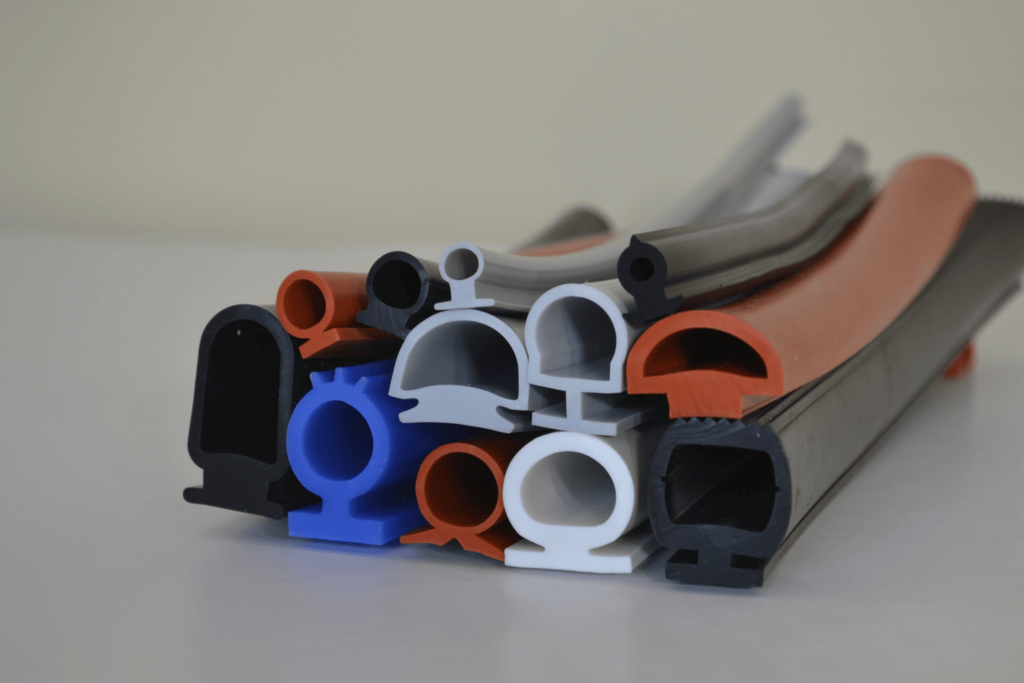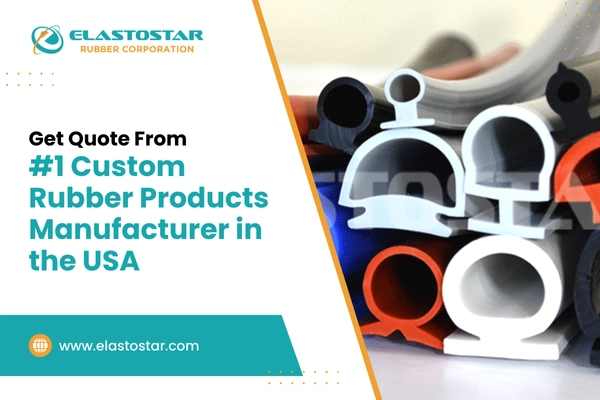Silicone rubber grades meet the diverse demands of industries, providing durability, flexibility, and performance under challenging conditions. These grades support applications like high-temperature resistance and food-safe solutions, ensuring reliability and efficiency.
Elastostar Rubber Corporation delivers custom extruded rubber products for specific industrial needs. From creating custom gaskets for precision sealing to using high-quality silicone material in specialized applications, we provide solutions designed to meet industry standards.
This blog explores the different silicone rubber grades and their importance across various sectors.
Table of Contents
What is Silicone Rubber?
Silicone rubber is a versatile synthetic elastomer composed of silicon, oxygen, carbon, and hydrogen. Its unique chemical structure provides flexibility, durability, and resistance to extreme temperatures, making it ideal for demanding industrial applications. Known for its stability, silicone rubber performs well in challenging environmental conditions such as UV radiation, ozone, and moisture.
One notable grade is the AMS 3195 silicone sponge, a high-performance material widely used in aerospace and industrial applications for its excellent sealing properties and lightweight nature. Additionally, closed-cell silicone sponge ensures effective insulation and cushioning, making it perfect for use in silicone rubber gaskets and rubber sealing gaskets that require airtight and weather-resistant seals.
What are the Types of Silicone Rubber?

Silicone rubber is available in various grades and types, each specific to industrial applications.
Metal Detectable Silicone Rubber
Metal Detectable Silicone Rubbers are specially crafted for industries such as food processing, this grade ensures safety by allowing contaminants to be detected easily with metal detectors. Applications include silicone door seals, which are crucial for maintaining hygiene and compliance with industry standards.
High-Temperature Silicone Rubber
Engineered to perform under extreme temperatures, high-temperature silicone rubber is ideal for aerospace, automotive, and industrial applications. This type is commonly used in components like silicone rubber gaskets to ensure reliable performance in harsh thermal conditions.
Liquid Silicone Rubber (LSR)
Known for its precision molding and excellent durability, LSR is suitable for medical, electronics, and automotive industries. Its adaptability makes it a go-to choice for applications requiring high accuracy and performance.
Closed-Cell Silicone Sponge
This type of silicone rubber offers excellent sealing properties while being lightweight and resistant to water, UV rays, and compression. It is often used in applications like AMS 3195 silicone sponge seals and gaskets for aerospace and industrial purposes.
Each grade of silicone rubber serves unique industrial needs, ensuring optimal safety, efficiency, and reliability.
What are the Properties of Silicone Rubber?

Silicone rubber is renowned for its exceptional versatility and performance, making it indispensable across industries.
Heat Resistance and Temperature Range
Silicone rubber can withstand extreme temperatures, ranging from -60°C to 300°C, ensuring consistent performance in high-temperature applications like custom silicone gaskets for industrial and automotive use.
Chemical Stability and Non-Toxicity
Silicone rubber is chemically stable, resistant to oils, chemicals, and UV exposure, and non-toxic, making it ideal for sensitive environments such as medical and food-grade applications. For example, custom extruded silicone products are frequently utilized in food processing and healthcare industries for their safety and reliability.
Durability and Flexibility
Its resilience under harsh conditions, combined with flexibility, makes silicone rubber an excellent choice for long-term use in sealing and insulation applications.
Electrical Conductivity
Specialized types like conductive silicone tubing provide excellent electrical conductivity and are widely used in electronics and communication systems.
These properties demonstrate why silicone rubber is the preferred material for demanding applications, delivering safety, reliability, and high performance.
Read More – High-Temperature Grades of Rubber.
Applications of Silicone Rubber
Silicone rubber’s unique properties make it a versatile material across various industries. Here’s how it’s applied in critical sectors:
Food and Beverage Industry

Silicone rubber is widely used for food-safe gaskets and seals due to its non-toxic, FDA-compliant properties. Applications include FDA silicone rubber gaskets in food processing equipment, ensuring safety and durability.
Aerospace Industry

Known for its thermal stability and flexibility, silicone rubber is used in seals and gaskets designed for high-altitude applications. Components like silicone sealing rings provide airtight solutions crucial for aircraft systems.
Electronics
Silicone rubber’s electrical insulating properties make it ideal for electronics. Products like conductive tubing are used for shielding and insulation in sensitive electrical systems, ensuring operational safety.
Construction and Industrial Applications

In construction, silicone rubber is used for rubber to seal windows, offering weatherproofing, thermal insulation, and protection from environmental stressors.
These applications highlight silicone rubber’s adaptability and reliability in meeting diverse industry demands.
Read More – How Rubber is Made for Industrial Uses
Manufacturing Processes of Silicone Rubber Grades
Understanding the production processes of silicone rubber is vital to appreciating its versatility across industries. Different manufacturing methods yield various grades, each optimized for specific uses.
| Silicone Rubber Grade | Manufacturing Process |
| Solid Silicone Rubber (HTV) | Processed through compression or injection molding. |
| Liquid Silicone Rubber (LSR) | Crafted through injection molding for precision designs. |
| Room-Temperature Vulcanized (RTV) | Applied as adhesives, sealants, or coatings; cures at room temperature. |
| Closed-Cell Silicone Sponge | Made by expanding solid silicone during vulcanization using blowing agents. |
Global Standards and Certifications for Silicone Rubber
For silicone rubber to meet industrial needs, it must comply with global certifications ensuring quality and safety.
1. AMS and ASTM Standards
- AMS 3195 silicone sponge is a certified grade widely used in aerospace for its lightweight and sealing properties.
- ASTM D2000 specifications ensure silicone rubber meets mechanical and thermal requirements for various industries.
2. FDA Compliance
Food-grade silicone rubber must meet FDA standards to ensure it is safe for contact with food and beverages. This makes it ideal for applications like FDA silicone rubber gaskets in food processing.
3. UL Ratings
Silicone rubber often carries UL 94 V-0 certification for flame retardant, ensuring safety in high-temperature and electrical applications.
4. ISO Standards
Compliance with ISO 10993 ensures biocompatibility for medical-grade silicone used in implants and healthcare devices.
Comparison of Silicone Rubber Grades
Silicone rubber grades are designed to meet the diverse needs of industries, each offering distinct properties and applications.
| Grade | Applications | Properties |
| FDA Silicone Rubber | Food and medical industries | Non-toxic, safe for food contact |
| Metal Detectable Silicone | Food processing and packaging | Detectable by machines to prevent contamination |
| High-Temperature Silicone | Aerospace, automotive | Withstands extreme temperatures |
| Custom Extruded Rubber | Specialized industrial applications | Made for specific industrial requirements |
Silicone rubber grades like metal detectable silicone ensure safety and compliance in critical sectors, while custom extruded rubber profiles provide precision-engineered solutions for specific industrial demands.
Why Choose Elastostar?
At Elastostar Rubber Corporation, we take pride in being a trusted partner for delivering high-quality custom silicone manufacturers and solutions. Our expertise lies in creating custom seals and gaskets customized to meet the unique requirements of various industries, including food and beverage, aerospace, and electronics.
With our commitment to precision and durability, we ensure that every product whether FDA silicone gaskets or specialized sealing solutions, meets the highest standards of performance and safety.
Choosing us means partnering with a company dedicated to reliability and innovation, even for the most demanding applications.
Recommended Reads

Conclusion
Selecting the right grade of silicone rubber ensures durability, safety, and efficiency across various industries. Each grade offers unique properties suited to specific applications, from high-temperature resistance to food-grade safety.
Whether it’s FDA silicone rubber for food and medical applications or custom gaskets for aerospace and electronics, choosing the right silicone solutions guarantees top-quality, reliable performance. Making informed decisions about silicone rubber grades can improve the efficiency and reliability of your applications.
FAQs
- What is the grade of silicone rubber?
Silicone rubber grades, like FDA-approved, high-temperature, and AMS 3195-certified, cater to diverse applications. At Elastostar Rubber Corporation, we offer customized solutions to meet your specific needs. - What is the highest grade silicone?
Medical-grade silicone and AMS 3195-certified silicone are considered the highest due to their safety, durability, and performance under stringent conditions. - How many types of silicone rubber are there?
Silicone rubber is broadly categorized into types like general-purpose, high-temperature, liquid silicone rubber (LSR), metal-detectable, and closed-cell sponge. - What is medical grade silicone rubber?
Medical-grade silicone rubber is biocompatible and ISO 10993 compliant, ideal for healthcare applications. Reach out to us for high-quality medical-grade silicone products customized for precision and safety. - What is the best grade of silicone?
The “best” grade depends on the application, for instance, FDA-approved silicone for food, high-temperature silicone for industrial use, or medical-grade for healthcare. - How to identify silicone rubber?
Silicone rubber is flexible, heat-resistant, and resilient under extreme conditions. Its smooth texture, elasticity, and ability to return to shape help identify it.


